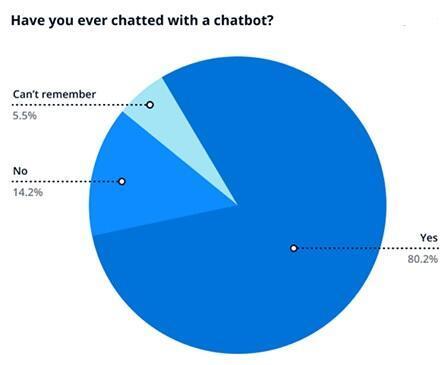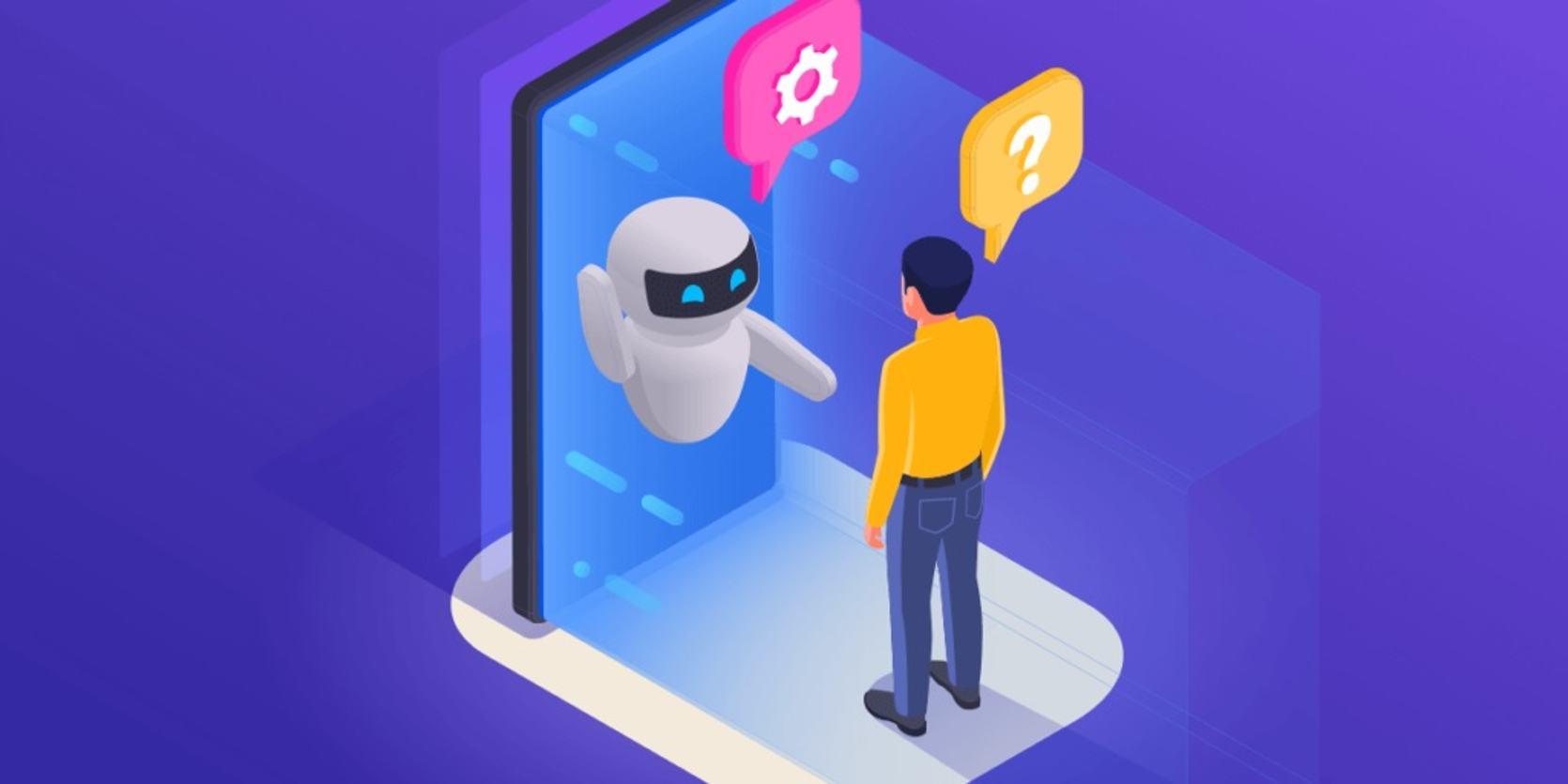Chatbots have become the go-to buddies for quick answers and assistance online. However, there’s a growing need for a reality check when it comes to sharing personal info like your email address after noting over 50% of these bots store your email address for marketing purposes.
Chatbots experienced a remarkable 92% increase in usage since 2019. In 2022, 88% of users engaged in at least one conversation with a chatbot.
Eliza, the pioneering chatbot, originated in 1966, predating the Internet. Yet, it took some time for chatbot technology to gain widespread traction. It wasn’t until 2016 that Facebook permitted developers to integrate chatbots into Messenger. Brands then began refining their chatbot capabilities, and customers eagerly explored their functionalities.
While interest in chatbots waned in 2019, the industry experienced a resurgence during the pandemic. In 2023, the chatbot sector witnessed substantial growth, propelled by the AI boom and the rising prominence of ChatGPT.
Emails, Emails, and More Emails
Once a chatbot gets hold of your email, it can feel like you’ve accidentally joined a non-stop marketing party. Those “exclusive offers” and “unmissable deals” start pouring in, making you wonder if you’ll ever escape the deluge of promotional content.
Your Privacy is at Stake
Picture this: you’re seeking help or advice from a chatbot, thinking it’s all in good faith, and BAM! Suddenly, your inbox is flooded with marketing emails you never signed up for. What gives? Turns out, not all websites using chatbots spill the beans on how they handle your data.
Do Chatbots Collect Data?
Chatbots typically collect text, voice and device information as well as data that can reveal your location, such as your IP address
Transparency? What’s That?
The real problem lies in the murky waters of unclear data policies. You might find yourself agreeing to terms without really knowing what you’ve signed up for. It’s like navigating through a foggy forest, but instead of trees, it’s terms and conditions you can’t quite see clearly.
Guarding Your Personal Info
So, how do you keep your personal data safe and sound? Here’s the lowdown:
- Peek at the Privacy Policies: Take a moment to dig into the website’s privacy policy. Find out how they handle your data and whether they’re planning to share it with the whole internet.
- Share Only What’s Necessary: If the chatbot doesn’t need your email to solve your problem, why spill the beans? Only share what’s absolutely necessary.
- Email Juggling Act: Ever thought about creating a separate email address just for these online interactions? It’s like giving out a spare key instead of your main one.
- Hang Out Where It’s Safe: Choose websites that put your privacy first. Look for the ones with virtual bouncers protecting your data at the door.
- Keep Tabs on Your Settings: Don’t forget to revisit your account settings regularly. Tweak those email preferences and say goodbye to the stuff you never signed up for.
As chatbots continue infiltrating our online lives, it’s crucial to keep our personal info on lockdown. By being savvy about what we share and demanding transparency from our favorite websites, we can navigate the digital realm with a bit more peace of mind. After all, it’s your data – keep it under your control.
Cybercrimes: Be careful what you tell GPT chatbot helpers
Headlines are buzzing with apprehensions surrounding the expanding capabilities of chatbots trained on large language models like OpenAI’s GPT-4, Google’s Bard, and Microsoft’s Bing Chat.
Experts caution against the potential for these advanced chatbots to propagate misinformation on an unprecedented scale, raising existential concerns for humanity.
Adding to the unease, a new area of worry has surfaced, exemplified by Italy’s recent prohibition of ChatGPT on privacy grounds. Experts also say ChatGPT and its competitors have the potential to enable bad actors to construct more sophisticated phishing email operations.
For example, generating emails in various languages will be simple – so telltale signs of fraudulent messages such as bad grammar and spelling will be less obvious.
Italy’s data regulator has expressed reservations about the model employed by ChatGPT’s owner, OpenAI, and has initiated an investigation to determine whether the company violated stringent European data protection laws.
While chatbots can undoubtedly offer utility in both professional and personal spheres, their data collection practices raise substantial concerns. Additionally, artificial intelligence introduces various security risks, with the potential to assist criminals in executing more convincing and potent cyber-attacks.
Chatbot Statistics 2024
Many companies have decided to use AI in their teams to stay afloat. This included chatbots. For example, chatbots could automate as much as 73% of work in healthcare,
Research indicates that chatbots have garnered favor among consumers, becoming their go-to solution for a range of issues, especially when time is of the essence.
Customers express satisfaction with chatbot assistance, provided it delivers real-time responses and swiftly resolves their concerns. However, one drawback arises when chatbots require human agent intervention, leading customers to expect prompt transition to a live chat with a human capable of resolving issues as efficiently as the bot.
Despite this limitation, chatbots remain effective for a significant portion of customers:
- According to Backlinko, 35% of individuals utilize chatbots to address complaints or acquire detailed information.
- PSFK reports that 74% of internet users prefer engaging with chatbots when seeking answers to uncomplicated questions.
- Drift’s findings indicate that 41.3% of buyers turned to digital assistants for their purchases post-2020.
- For tasks like making reservations at restaurants or hotels, 33% of customers express a preference for using a chatbot (Drift).
- HubSpot highlights that 40% of web users are indifferent to whether they are served by bots or human agents, as long as they receive the necessary customer support services.
- The Chatbot reveals that 64% of consumers find 24/7 availability to be the most beneficial feature of a chatbot.
- Business Insider notes that 48% of people prioritize a chatbot’s ability to resolve issues over its personality.
The younger generations show a keen interest in chatbot technology. Millennials prefer handling support issues on their own, while Gen Z is most content resolving problems through concise messages that quickly lead to a solution.
A majority of millennials, approximately 60%, depend on chatbots for various services (Service Bell). On average, users generate four inquiries in a single chat session with the bot
Meanwhile, 20% of Generation Z users express a preference for initiating their customer service interactions through a chatbot, with the option to switch to a live human if needed
Businesses have also observed substantial enhancements in complaint resolution speed, with 90% reporting significant improvements
Major players like LinkedIn, Starbucks, British Airways, and eBay are set to maintain their utilization of chatbots throughout 2024. Additionally, 58% of websites employing chatbot software cater specifically to B2B companies (Boomtown)
Customer Support Bots
The global population of digital buyers exceeds 2 billion. Given the ongoing trends, particularly those amplified by the pandemic and the growing enthusiasm for AI, the demand for customer support is anticipated to rise.
Consequently, brands looking to scale or enhance customer service without escalating costs and workforce numbers find customer service bots to be a pragmatic solution.
Notably, the majority of issues on live chat are resolved within 42 seconds, and 64% of customer service agents utilising AI chatbots can dedicate most of their time to addressing complex cases (Salesforce).
In 2023, ChatBot handled 134,565,694 chats, and businesses offering engaging chatbot experiences witness a 70% increase in customer interactions and responses (Localiq).
According to Hubspot a significant 81% of customers prefer self-service options before reaching out to a customer service representative.
The financial impact of inadequate customer support is substantial, with companies losing anywhere from $75 billion to $1.6 trillion annually (Midlands Technical College).
A considerable 67% of internet users resort to social media, live chat, or texting to contact customer service (eMarketer), and 56% of customers prefer messaging over calling for customer service (Outgrow). Notably, chatbots can handle 30% of live chat communication (LiveChat).
In terms of efficiency, the average queue waiting time for live chat in 2023 was 3 minutes and 40 seconds, a notable improvement from 5 minutes and 16 seconds in 2022
Chatbot industry for marketing
Recent advancements in chatbot technology and machine learning have enabled chatbots to provide a more personalized customer experience.
Apart from offering personalized support at scale, businesses increasingly use chatbots to promote their products and services, generate leads, and increase website engagement.
- 80% of companies use conversational marketing tools to engage with customers and potential clients.
- 17% of businesses want to achieve their marketing and lead generation goals using chatbots.
Do People Prefer Chatbots Or Human Customer service?
According to a survey in 2023 whopping 53% of boomer respondents indicated that these intrusive chatbots were nothing more than a nuisance that chatbots annoyed them to no end.
Chatbot Interaction
Recent statistics indicate a noteworthy trend – a staggering 80% of internet consumers have engaged with chatbots at least once in a given year. This statistic not only underscores the growing prevalence of chatbots but also signals a shift in user behavior and acceptance.

Global Chatbot Marketing Revenue Reaches $83.4 Million In 2024
According to figures published by Statista, revenue generated from the chatbot industry amounted to around $83 million in 2021.
As part of the same study, Statista calculated the predicted revenue growth of the industry over the next few years. The study found that the market will continue to grow substantially and by 2027 it’s expected to be worth around $454.8 million.
Extended Summary – Be Mindful When Sharing Your Email Address With A Chatbot.
Customers and other users should be mindful of the context in which they are prompted to share their email addresses. If the request seems unnecessary for the intended interaction or if the chatbot is not associated with a reputable entity, it is advisable to abstain from providing personal information.
While chatbots offer convenience and efficiency, users must think twice about privacy before sharing email addresses. Being vigilant about data security, understanding the policies in place, and evaluating the necessity of providing personal information can contribute to a safer and more secure online experience.







